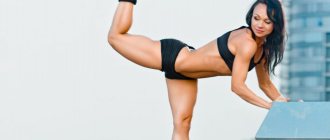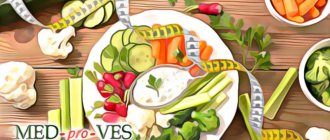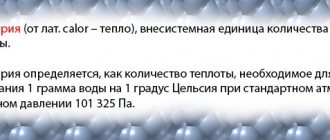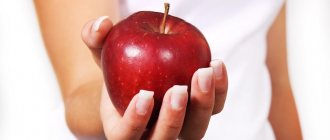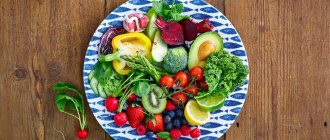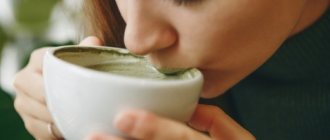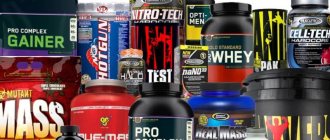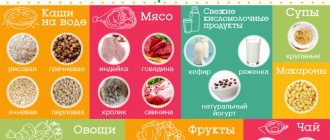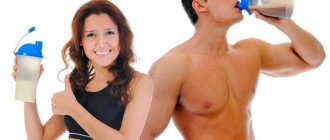The effectiveness of sports activities depends not only on the intensity of training and exercise regimen, but also on nutrition.
With an incorrectly organized diet, athletes are unable to achieve the desired results.
To create the correct menu for a man or woman who is actively involved in sports, you will need to take into account many factors.
The basics of a proper and balanced diet when playing sports
Regardless of what kind of sport a person plays, what age and gender he is, there are a number of simple principles developed for creating a sports diet. They are based on the principles of healthy eating:
- Hunger is contraindicated during physical activity. When fasting, the body begins to break down muscle proteins first, which inevitably leads to a loss of muscle mass and, accordingly, a deterioration in training productivity.
- Sports mode eliminates rushed eating. When eating too quickly, a person does not feel full and is prone to overeating.
- When playing sports, you need high-quality natural products.
The principles of healthy eating listed above are suitable for all people, regardless of the intensity of physical activity and involvement in sports.
Be sure to watch: How to properly organize nutrition for an endomorph
Three rules for creating a sports diet for every day
When developing an optimal sports diet, you must adhere to three basic rules:
- Complete exclusion of alcohol. Sufficient water intake.
- A clearly balanced ratio of proteins, fats and carbohydrates.
- Sufficient amount of vitamins and microelements.
These rules guide all nutritionists and sports nutrition specialists.
Eliminate alcohol and add water
Alcohol is contraindicated during sports activities, since it negates all the athlete’s efforts to build muscle mass. When drinking alcohol, a number of processes occur in the body that interfere with the absorption of proteins:
- Blocking the breakdown of protein into amino acids. As a result of this process, the muscles do not receive nutrition.
- Removing water from the body. Without water, chemical and metabolic processes in the body, including the absorption of proteins, are impossible. When dehydrated, protein synthesis slows down or stops altogether.
- Blocking the energy generation process. When drinking alcohol, most of the energy is spent on breaking down alcohol and removing its breakdown products.
Drinking alcoholic beverages is contraindicated when playing sports, as alcohol has a detrimental effect on the heart, liver and kidneys. Since these organs receive increased stress during training, alcohol can provoke serious disruptions in their functioning. Read more about training after drinking alcohol in our article.
Proper drinking regime during sports involves drinking clean drinking water. Its amount does not include liquids consumed by humans, for example:
- tea;
- coffee;
- soups;
- fruit or vegetable juices;
- cold drinks.
When calculating the total amount of water consumed by an athlete, the drinks listed above are not taken into account.
The table shows the approximate amount of water an athlete needs before, after and during training.
| Time | 2 hours before class | 15 minutes before starting strength training or cardio exercise | After class |
| Amount of water in milliliters | 300 | 100 | 300 |
Important! It is not recommended to drink a lot of water during intense exercise. It is enough to take small sips or rinse your mouth.
There are a number of recommendations regarding the water regime and the use of various drinks during physical activity:
- Water with a little lemon juice is refreshing during exercise, invigorating and quenches thirst.
- When training for more than 1 hour, the athlete requires special drinks containing electrolytes. They maintain an optimal level of water balance in the body.
- Training excludes the use of energy drinks. They increase the load on the heart and blood vessels.
- Tea and coffee are not recommended before starting classes. You can drink them no later than half an hour before the start of your workout.
With proper drinking regimen, the effectiveness of training increases.
Healthy proteins, fats and carbohydrates
Any menu, including a sports menu, consists of three main components - proteins, fats and carbohydrates. A balanced ratio of these components is the key to successful training.
The main source of energy for the body is carbohydrates. They are divided into simple, that is, monosaccharides, and complex, that is, polysaccharides. When simple carbohydrates are broken down, blood sugar levels rise very quickly and fall just as quickly, resulting in a feeling of hunger.
When complex carbohydrates are broken down, blood sugar increases gradually. It is complex carbohydrates that provide sufficient energy during physical activity.
The table shows sources of simple and complex carbohydrates.
| Complex carbohydrates | Simple carbohydrates |
|
|
Important! Before sports activities, you should consume complex carbohydrates in order to have enough strength. After training, it is recommended to consume a small amount of simple carbohydrates to quickly replenish your strength.
The recommended amount of carbohydrates should not exceed 9 grams per 1 kilogram of body weight during exercise. When preparing for competitions, their amount is reduced to 3-2.5 grams per 1 kg of body weight.
Proteins are the building blocks of the body. This is a mandatory and indispensable component of sports nutrition. Sources of protein are meat, fish, seafood, eggs, dairy products.
Important! With increased physical activity, you need to consume approximately 1.5 grams of protein per 1 kilogram of body weight.
Fats are an important component of a healthy every day menu. The recommendation to stop using them is completely wrong. A certain amount of healthy fats is critical to your diet. You need to consume approximately 0.5 grams of healthy fats per 1 kilogram of body weight.
Fats are divided into two groups:
- Saturated. Harmful, slowing down metabolic processes, provoking the formation of cholesterol plaques in blood vessels.
- Unsaturated. Healthy fats. Necessary for the synthesis of hormones, muscle mass growth, and normal functioning of the immune system.
The table shows sources of saturated and unsaturated fats.
| Saturated | Unsaturated |
|
|
Important! The optimal amount of fat in the diet is no more than 20% of calories.
Vitamins and microelements
To quickly increase muscle mass, you need to include a sufficient amount of vitamins in your diet. Vitamins are active substances that are not produced by the body on its own, but without which all organs and systems suffer.
The table provides a list of the main vitamins that are essential in proper nutrition (including in the diet for active sports), as well as their sources.
| Vitamin | Foods that are sources of vitamins |
| A | fish oil, melon, pumpkin, carrots, spinach |
| IN 1 | whole grain bread, cereals |
| AT 2 | dairy |
| AT 4 | peanuts, eggs, liver |
| AT 5 | beef, chicken, liver, potatoes |
| WITH | citrus fruits, bell pepper, currants, sea buckthorn, kiwi |
| D | fish, seafood |
| E | vegetable oils, nuts, seeds |
Minerals are also indispensable in sports nutrition. The following minerals are important for those involved in physical activity:
- sodium and potassium, which regulate the amount of water in the body and normalize blood pressure;
- magnesium, responsible for endurance and stress resistance;
- calcium, which is involved in the process of muscle growth;
- iron, which regulates hemoglobin levels.
Important! A large number of vitamin and mineral complexes have been developed for athletes. You can use them on the recommendation of a doctor. An excess of vitamins and minerals can negatively affect organ function.
Composition of an athlete's diet
Features of rationally formulated nutrition for athletes include the mandatory presence of the following components:
- proteins – from 30 to 35%;
- fats – from 10 to 20%;
- carbohydrates – from 50 to 60%.
Depending on gender, age, number of workouts, set goals and required tasks, an individual menu is compiled. At the same time, the food of athletes should not exceed the above percentage of BZHU and have a positive effect on maintaining a healthy, fulfilling, athletic lifestyle!
Squirrels
The correct diet for a beginner or an experienced athlete must include food that includes slowly and quickly digestible proteins. It is these components, successively consisting of amino acids, that are endowed with proteins and peptides. These organic catalyst substances develop growth, strengthen tissues and are essential for maintaining the immune system.
An athlete's daily diet requires him to consume foods rich in protein components. Average statistical data suggests that you should eat from 15 to 25 g of protein per 10 kg of your own body weight per day. This is directly related to the activity and tension of the body.
An athlete who wants to gain weight should eat foods high in protein components. The California Research Foundation has identified 7 essential foods for heavy and bulk athletes. These are cottage cheese, milk, chicken eggs, boiled or steamed beef, chicken fillet (breast), red sea fish, chickpeas (chickpeas).
To maintain or reduce body weight, you need to eat healthy foods with a small amount of protein: lean veal, rabbit, poultry, low-fat bran kefir, light sour cream, yogurt, seafood.
Carbohydrates
Carbohydrates are biologically active, organic substances that perform a variety of beneficial functions in the body. They are the basis of metabolic processes, restoration of strength, and increase in energy. That is why sports nutrition products should include simple and complex carbohydrates.
An athlete's diet should include from 5 to 9 g of carbohydrates per 1 kg of body weight per day. Therefore, sports nutrition per week implies from 35 to 63 g of carbohydrates per 1 kg of weight. Moreover, the emphasis should be on complex carbohydrate foods and consume them strictly before 14:00. That is, in the first half of the day.
It is believed that the main source of complex carbohydrates is starch. It is the starch substance that is produced by any plant, which, when entering the body, provides it with long-lasting energy - glucose.
Fats
A sports, balanced and at the same time strict diet should include healthy, healthy fats. After all, they are consumed in the process of power, heavy loads, which are characterized by a slow rhythm of execution. Fat elements maintain the stability of internal organs and body temperature.
Fats come in both plant and animal origin. That is why recipes for active athletes are prepared taking into account different variations of fats. For example, this could be a salad with olive oil to fill the body with hydrogen.
To maintain an athletic figure, proteins and fats must be consumed together. However, you need to be careful when choosing products. That is, give preference to low-fat cottage cheese, eat eggs without yolk, and so on. Bodybuilder Denis Semenikhin tells us more.
The importance of proper nutrition for an athlete
When playing sports professionally or semi-professionally, it is necessary to remember that nutrition makes up 80% of success, while the remaining 20% depends on physical activity and a properly designed training regimen.
Since during intense physical activity the body needs an increased amount of energy, the athlete’s diet must be sufficiently high in calories so that he does not experience a loss of strength.
Regardless of what sport a person engages in, there are a number of nutritional requirements:
- the number of calories corresponding to the load;
- a sufficient amount of nutrients and water;
- the use of dietary supplements to enhance metabolic processes;
- a clearly planned menu that corresponds to the athlete’s goals, for example, gaining or losing muscle mass, reducing the amount of fat in the body, in professional language called cutting, etc.
Important! When compiling an adequate diet for professionals, taking into account all factors, it is necessary to contact a sports nutrition specialist.
Nutrition for athletes: basic concepts and principles
Achieving the highest performance in sports requires athletes to adhere to a strict diet. That is why proper nutrition contains in its arsenal the products necessary for athletes, based on the following principles:
- training nutrition requires daily eating food with a sufficient level of energy indicators, vitamins, minerals and other microelements;
- you should add all kinds of biologically active additives of natural origin to normalize metabolism and activate the metabolic process;
- nutrition for athletes needs to be changed, since it directly depends on body weight (decreasing, increasing or maintaining the same weight).
To avoid an energy imbalance and not to affect the vital functions of the athlete’s body (respiratory, digestive or cardiovascular), it is imperative to monitor the quality of the nutrients consumed. Therefore, athletes eat exclusively healthy, highly environmentally friendly food without genetic modifiers and other chemical elements.
The role of good nutrition in the lives of athletes
Athletes eat nutritiously, carefully monitoring the amount of calories, proteins, fats and carbohydrates they consume. A balanced diet for bodybuilding athletes is, first of all, healthy, natural, animal or plant products, correctly distributed throughout the day.
As a rule, recipes for athletes require strict planning and calculation, according to percentage standards and the ratio of proteins, fats and carbohydrates (BJU). This is due to different types of physical activity and sports. Therefore, proper nutrition for an athlete, enriched with vitamins, is more than specific and must meet the following requirements:
- enrichment with all kinds of micronutrients;
- constancy and normalization of literally all metabolic processes;
- keep morphological indicators in good shape by regulating and maintaining the weight of the whole body as a whole.
A diet for an athlete, based on fresh and high-quality products, allows you to forget about unforeseen unhealthy situations: illness, injury, exhaustion, imbalance, and so on.
Basic principles of a sports diet
Healthy nutrition for literally all athletes, regardless of the type of sport, requires the consumption of large amounts of water and a strictly defined amount of calories and elements that will replenish the costs of vital organs. Food for athletes requires the intake of natural protein-carbohydrate components and unsaturated fats. The formula for the ratio of BJU in units, close to WHO standards, looks like this: BJU = 1:1:4. Micronutrients, vitamins and minerals must be consumed daily so that the organs are saturated and do not experience unexpected “failures”.
A diet for athletes, firstly, begins with calculating calories based on the required portion of proteins. This is due to the type of sport and the required physique. After all, protein ingredients are the primary “foundation” for muscle growth. If the goal is to lose weight, “get dry,” it is advisable to reduce their number to a minimum.
Just like the level of protein consumed, carbohydrates are calculated based on the degree of saturation. They can be absorbed slowly or difficultly and for a long time by the cells of the body. To absorb many beneficial substances, you need to take a reasonable approach to fat consumption.
The World Health Organization (WHO) has published the basic principles on which an athlete's balanced diet is based:
- steamed vegetables, fresh fruits (minimum 400-500 g) should be eaten every day;
- given the speed of digestion of fruits, they should be eaten half an hour to an hour before the main meal;
- root vegetables containing a lot of starch (potatoes) should be limited due to their high vitamin C content;
- consumption of trans fats up to 1% and fats of different origins up to 10% reduces the risk of heart disease and diabetes;
- fried foods are strictly prohibited, since omega-3,6,9 are converted into toxic, poisonous substances;
- salt and sugar should not exceed 10% of the daily value;
- before 14:00 you need to eat as many carbohydrate and fatty foods as possible;
- You should have dinner 3 hours before bedtime or 1.5 hours if it is dairy products.
Is calorie content important when choosing healthy foods?
When playing sports, you need to consider your calorie expenditure. Insufficient calories lead to exhaustion of the body, while too many calories contribute to the gain of fat mass. When compiling calorie intake, the following factors should be taken into account:
- body mass;
- kind of sport;
- level of physical activity;
- age;
- floor.
Important! It is necessary to increase the caloric content of the diet mainly through protein dishes.
When selecting sports nutrition, it is necessary to focus on the athlete’s well-being, fluctuations in his weight and the ratio of muscle to fat in the body.
You may also be interested in: Calorie consumption during physical activity: tables and calculations
When playing sports, it is important to eat according to the regime
Sports nutrition implies a strict regime. Since split meals 4-5 times a day seem optimal, meal times should be strictly determined in accordance with training.
A sports diet includes a hearty and healthy breakfast. It has been found that people who skip their morning meals reduce the effectiveness of their training due to impaired metabolism. Eating in the morning “starts” metabolic processes in the body and gives a person energy for exercise.
You may also be interested in: Fitness nutrition: training, losing weight, enjoying food
Athletes' diet
The diet of people experiencing intense physical activity differs significantly from the diet of an ordinary person, so athletes must carefully plan their menu. The main aspects of this are the following:
- Food must be complete, fresh and of high quality. You should only lean on those foods that benefit the body, and those that are harmful should be completely eliminated.
- Amount of food in the rational diet of athletes.
Here everything should depend on the nature of physical activity experienced by the person playing sports. Some people need large amounts of food in order to gain muscle mass, others need to lose it, so nutrition should be significantly limited. That is, it is necessary to take into account your training goals and draw up a healthy diet plan. Thus, playing sports will only strengthen the body and not disrupt its functioning.
Nutritionists and doctors recommend that athletes eat small amounts but often. That is, not 3-4 times a day, but 5-6 times. This helps not to overload the body before exercise and maintain a constant energy balance in it. In addition, in this way, food is better absorbed and processed faster, without a feeling of heaviness and discomfort. Let's consider the nutritional features of athletes.
Diet features
Athletes' nutrition varies depending on their body type. Its calorie needs, as well as the proportions of its diet, depend on this.
For people with different body types
All people, regardless of gender, are divided into the following groups:
- a mesomorph with an athletic build needs to maintain optimal weight;
- ectomorph, prone to thinness, needs to gain weight;
- an endomorph prone to obesity needs to lose weight.
Each of these types must follow specific nutritional guidelines.
| Body type | Mesomorph (increase in calories) | Ectomorph (increase in calories) | Endomorph (calorie reduction) |
| Diet proportions |
|
|
|
| Recommended Products |
|
|
|
| Nutrition tips | Consumption of fish oil, flaxseed oil, nuts. | Increase calorie content by 500-600 kcal. | Avoid eating simple carbohydrates. |
The table presents the basic rules of nutrition by body type, depending on the goals of sports activities.
For gaining muscle mass
People belonging to the mesomorphic and ectomorphic types, during sports activities, need to gain body weight due to the increase in muscle tissue. They need to increase their caloric intake by consuming proteins, fats and carbohydrates in strict proportions.
Recommendations for adjusting nutrition for these types are presented in the general table above. It provides recommendations on how much to increase your intake of proteins, fats and carbohydrates.
For weight loss and burning subcutaneous fat
Endomorphs, who, as a rule, have excess body weight, need its qualitative reduction, which will occur due to fat, not muscle tissue. People with a similar body structure need to reduce their overall caloric intake. Read more about nutrition for an endomorph in our article.
The proportions of reducing the consumption of proteins, fats and carbohydrates are given as percentages in the table. It also provides recommendations for choosing products for people with an endomorphic body type.
Proper nutrition and exercise give amazing results for endomorphs when losing weight. At the same time, it is the balance of substances in the diet that is important with a general reduction in caloric content of food. To further stimulate fat burning, protein and other diets are used.
Depending on the body type, the consumption of certain products is regulated, the diet is adjusted, thus reducing or gaining body weight.
Read our article about creating a menu for fans of fitness nutrition for weight loss.
List of main products
Nutritionists select sports nutrition products in such a way that they support not just a beautiful, sophisticated figure or bodybuilder’s structure, but that they provide a kind of impetus for vigorous brain activity.
Below is a list of sports nutrition products:
- Chicken eggs, rich in protein components, vitamins, zinc, iron and calcium.
- Low-fat cottage cheese, rich in proteins of varying degrees of speed - fast and slow. Cottage cheese is a post-workout staple.
- Cereal oat flakes, including a lot of fiber, minerals, vitamins and protein-carbohydrate elements.
- Red sea fish, which speeds up metabolic processes, supplements the body with omega-3 fatty acids.
- Buckwheat, which will help, depending on the quantity, build muscle mass or lose muscle mass.
- Beef is an excellent source of the most important components: proteins, fats and carbohydrates.
- Turkey contains a huge amount of minerals, useful rare vitamins and protein.
- Chicken fillet with a minimum percentage of fat and almost 50 g of protein per 200 g of its own weight.
- Purified water, without excess chlorine, promotes a surge of energy and proper digestion.
However, the features of a healthy diet for athletes do not end with the above list. Additionally: olive oil, as many seasonal vegetables as possible, low-fat sour cream, yogurt, fruits, milk, kefir, hard low-fat cheeses, cereal porridges.
Sample sports menu for the week: recipes for every day
Sample sports menus for men and women have been developed. If you follow these recommendations, you can quickly get into the desired shape.
Proper diet for men
An approximate weekly diet for men with weight loss and active sports is given in the table.
| Day | Breakfast | Snack | Dinner | Afternoon snack | Dinner |
| Mon | Eggs, greens, whole grain bread, tea/coffee, honey. | Cottage cheese/yogurt. | Soup, steamed fish, salad. | Orange/apple. | Chicken breast, vegetables. |
| W | Eggs, mushrooms, cheese. | 2 apples. | Borsch, boiled beef. | Yogurt, apples. | Steamed liver, vegetables. |
| Wed | Oatmeal, 1 pear. | Tuna, tomatoes, greens. | Stewed turkey breast, tomatoes, herbs. | Fresh juice. | Baked salmon, vegetables. |
| Thu | Eggs, cheese, herbs, coffee/tea. | Cottage cheese. | Chicken breast, vegetables, berries. | 1 fruit. | Boiled meat, vegetables. |
| Fri | Yogurt, banana, berries. | Cheese cheese, nuts. | Turkey, vegetables. | Cottage cheese, berries. | Baked beef, mushrooms, vegetables. |
| Sat | Eggs, greens, tea. | Feta cheese, vegetables. | Chicken, vegetables. | Yogurt, apple. | Steamed wild rice, shrimp. |
| Sun | Oatmeal, tea, honey. | 2 oranges/apples. | Steamed chicken, vegetables, dried fruits. | Cheese cheese, nuts. | Stewed liver, vegetables. |
When creating an individual menu for a man as part of proper nutrition for sports, it is necessary to adjust the amount of products based on individual indicators.
Preferred dishes for girls
An approximate weekly diet for women is presented in the table.
| Day | Breakfast | Snack | Dinner | Afternoon snack | Dinner |
| Mon | Eggs, oatmeal with water, dried fruits. | Kefir, banana. | Chicken breast, buckwheat, vegetables. | Cheese/ham, vegetables. | Steamed beef, vegetables. |
| W | Muesli, milk, coffee/tea. | Cottage cheese/yogurt. | Vegetable soup, buckwheat, chicken breast. | 1 fruit. | Cottage cheese, berries. |
| Wed | Eggs, banana, coffee. | Cottage cheese, dried fruits. | Borsch, beef. | Cheese cheese, green vegetables. | Steamed brown rice, vegetables, tea, honey. |
| Thu | Buckwheat, dried fruits, coffee/tea, honey. | Cheese cheese, nuts. | Turkey, vegetables. | 1 apple. | Baked salmon, vegetables. |
| Fri | Oatmeal, berries, coffee, honey. | Tuna, tomatoes, greens. | Steamed chicken, vegetables, dried fruits. | Cheese, herbs, tomatoes. | Steamed brown rice, shrimp. |
| Sat | Eggs, cheese, herbs, coffee/tea. | 1 banana. | Borsch, boiled beef. | Cottage cheese, berries. | Baked beef, mushrooms, vegetables. |
| Sun | Eggs, greens, whole grain bread, tea/coffee, honey. | 1 apple. | Soup, steamed fish, salad. | Yogurt, apple. | Stewed turkey breast, tomatoes, herbs. |
The set of correct menu products for girls listed in the table can be prepared in the form of salads, or resort to various cooking methods, except for frying.
Diet options
The diet must be compiled taking into account the daily calorie requirement, which depends on the level of load. With a daily requirement of 2,600 calories, the diet might look like this:
- Breakfast: a couple of boiled eggs, 200 grams of cottage cheese, oatmeal with milk and olive oil, bran bread, tea.
- Second breakfast: fruit, bun, glass of yogurt.
- Lunch: buckwheat with milk, a couple of eggs omelet, vegetable salad, whole grain bread, low-fat cheese, tea.
- Afternoon snack: half a bowl of porridge with fruits or berries, cottage cheese, a glass of juice.
- Dinner: fresh fruits and vegetables, bran bread, a glass of kefir.
Recommendations for proper and healthy food
There are many successful and famous athletes whose knowledge of healthy eating is reflected in their athletic success. Having extensive training experience, they willingly share advice with novice athletes.
Bodybuilder Helmut Strebl
Helmut Strebl, a famous bodybuilder, model and trainer, advises adhering to the following principles in sports nutrition:
- 5-6 meals a day;
- low fat content in the diet;
- only complex carbohydrates.
An approximate diet of proper nutrition by G. Strebl for every day when playing sports is presented in the table with the menu. It contains foods and supplements for each of the 6 meals.
| 1 | 2 | 3 | 4 | 5 | 6 |
| 1-7 egg whites, 1 yolk, chicken breast, coffee, jam. | Shake: 80 grams of carbohydrates and 50 grams of protein. | Brown rice, chicken/turkey. | Brown rice, chicken, fish/turkey. | Brown rice, chicken, fish/turkey. | 10 grams of protein, 3 pieces of whole wheat toast. |
Important! Before following the presented sports diet, you should consult a doctor, since such a strict sports regimen and intense training can significantly harm your health.
Fitness model Alice Matos
Famous Brazilian fitness model, athlete and social media star, Alice Matos follows the principle of eating five meals a day. Its approximate menu is given in the table.
| 1 | 2 | 3 | 4 | 5 |
| Egg whites, low-fat milk, oatmeal. | Steamed chicken breast, wild rice, vegetables. | Protein cocktail. | Baked fish, vegetables. | 5 egg whites. |
The model advises eating no later than 7 pm and making sure there are enough vitamins and minerals in your diet.
Fighter Fedor Emelianenko
The famous Russian wrestler, Fedor Emelianenko, has a special opinion on how to eat properly when playing sports. He believes that an athlete should eat regular foods and maintain a normal, sensible diet.
The wrestler does not consider it necessary to use special cocktails and mixtures. The only supplements he introduces into the diet are vitamin and mineral complexes. In his opinion, everyone can determine for themselves how to eat properly when playing sports.
Healthy Breakfast Basics
The recipe for a healthy and proper breakfast is simple. His menu should consist of easily digestible foods high in microelements and vitamins. The calorie content of the morning meal should be 40% of the daily diet, that is, from 360 to 500 kcal. It is necessary not only to count the calorie content of foods, but also to correlate food with the individual needs of the body.
Benefits for breakfast are:
- eggs containing proteins and other beneficial substances;
- nourishing, protein-rich, virtually devoid of carbohydrates, figure-friendly chicken meat;
- bran and rye bread, whole grain flour products;
- Honey, rich in natural antiseptics, beneficial substances, carbohydrates, relieves fatigue and stress;
- cereal porridges that provide a long feeling of satiety;
- kefir and green tea.
Lovers of invigorating coffee do not have to give it up completely, but they should limit their consumption of the drink. It is recommended to drink no more than one cup of coffee for breakfast. This is approximately 50-70 g, but no more.
Recommendations and advice from nutritionists:
- To ensure that breakfast is not a burden and brings pleasure, you need to reschedule dinner and not overeat at night. This will allow you to feel a slight feeling of hunger in the morning.
- It doesn't take much time to prepare an easy and healthy breakfast. It is enough to get up in the morning 15 minutes earlier than usual.
- Coffee should be drunk after meals. On an empty stomach, this drink irritates the mucous membranes and can cause gastritis.
- Breakfasts should be turned into a full meal.
If a person has never had breakfast before, it is impossible to rebuild the body in one day. It is necessary to accustom yourself to a new habit gradually. It is better to start with a light snack, and then gradually increase the calorie content of breakfast.
How to start eating healthy and exercising at home
When switching to proper nutrition and sports regimen, you must follow two basic rules:
- gradualism;
- positive attitude.
It is impossible to force yourself to start leading a healthy lifestyle right away - it will take at least a month to form good habits.
It is necessary to motivate and praise yourself for every achievement, no matter how small. Then the transition to a sports diet will become easy, enjoyable and will benefit the body.
Read our material on how to start eating healthy.
Main conclusions
A sports nutrition regimen during training requires strict adherence to the regimen.
When switching to a new diet, it is necessary to take into account both general and individual factors so as not to harm your health.
We should not forget about the drinking regime, as well as taking sufficient amounts of vitamins and minerals.
When switching to a new type of diet, it is necessary to consult with a specialist to develop an optimal diet, taking into account all individual characteristics.
